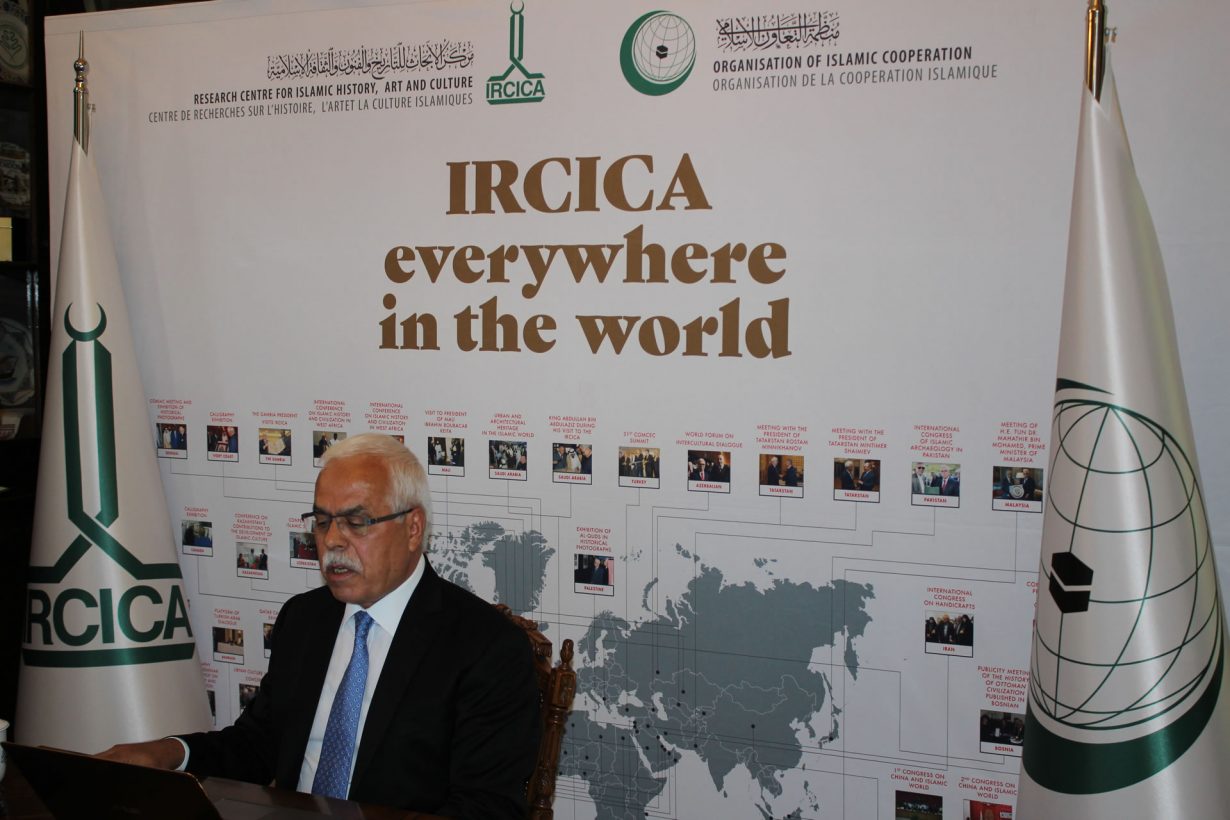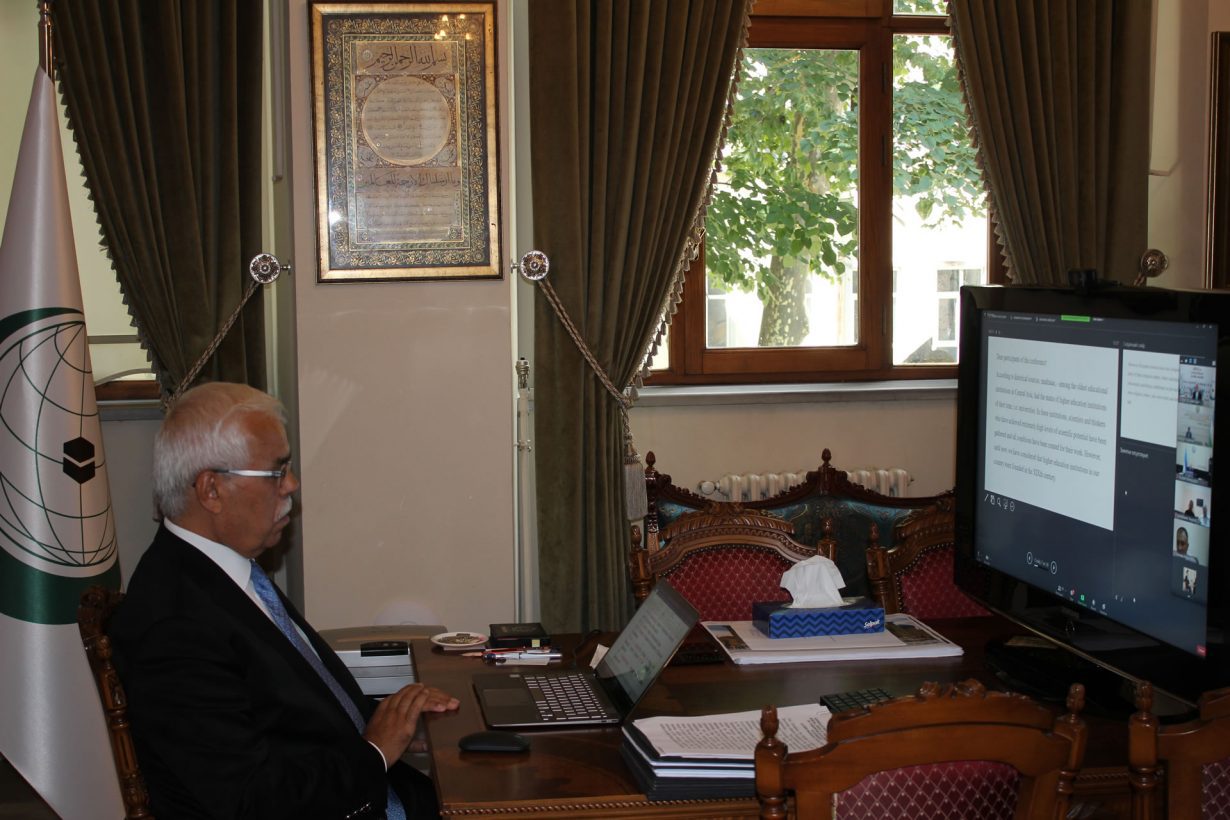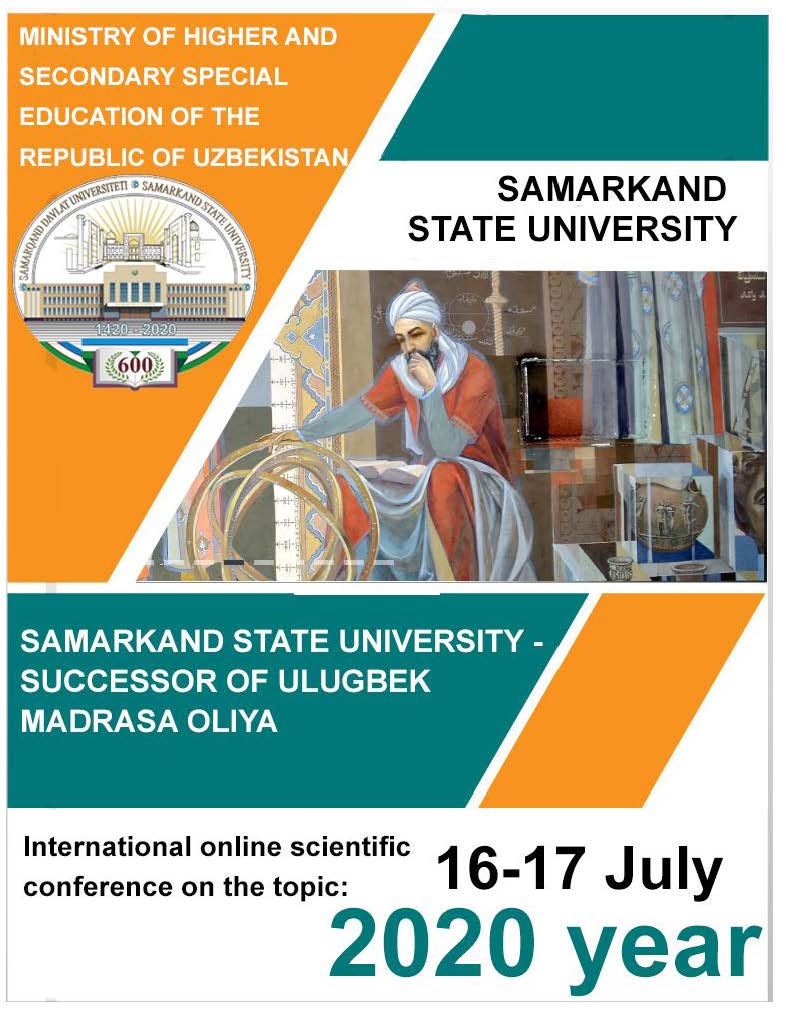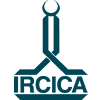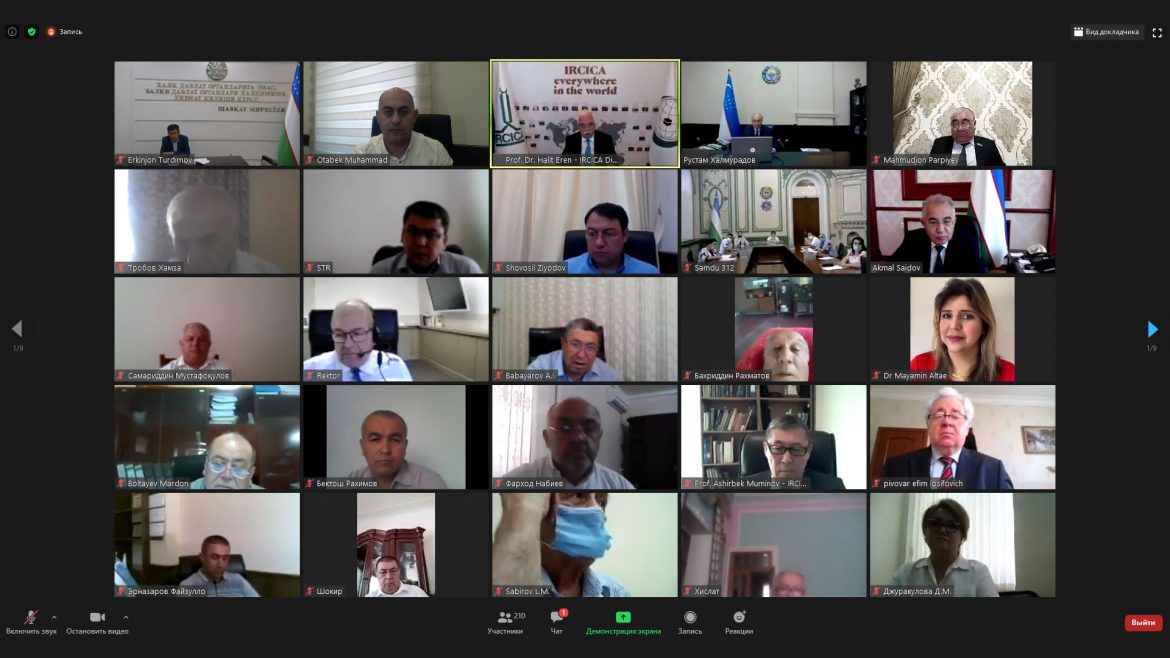An international online scientific conference on the theme “Samarkand State University – Successor of Ulugbek Madrasa” was organized by the Ministry of Higher and Secondary Special Education of the Republic of Uzbekistan on 16 July 2020, to commemorate the 600th anniversary of Samarkand State University, which is the successor of Ulugbek’s madrasa. The Uzbek astronomer-Ruler Ulugbek had established his grand-scale madrasa for higher studies in the year 1420 at Samarkand. In Ulugbek Madrasa, mathematics and astronomy were taught together with religious sciences. During the 1420s Ulugbek also established his astronomical observatory.
Ulugbek Madrasa’s present-time continuation in Samarkand State University is traced and established on the basis of historical sources and scholarly research, as also underscored by some of the papers presented in ths conference.
The online conference organized to commemorate the 600th anniversary of Samarkand State University heard addresses and papers by nearly 50 speakers consisting of ministers, university rectors and presidents of academies, heads of international organizations and agencies, and scholars from various countries in Asia and Europe.
IRCICA Director General Prof. Dr. Halit Eren was invited to address the Introduction session. Prof. Dr. Halit Eren pointed out that the foundation of Ulugbek Madrasa in Samarkand was a golden achievement in the history of science and education. He said that Ulugbek’s madrasa evolved into modern times as embodied in Samarkand University, acquiring the tradition of a deep-rooted institution of learning. In this sense, said Prof. Eren, “Samarkand State University constitutes an example of the evolution of a classical higher educational institution, the madrasa, into a modern university. This is a link between the past to the present in the continuum of science, knowledge and education.” Prof. Eren also described the aims, scope and implemented projects relating to the involvement of IRCICA, the OIC’s cultural subsidiary organ, in the study of the history of science and education in the Islamic world. He said that a large number of symposiums, research projects, and reference books including biographical and bibliographical publications, have been devoted by IRCICA to the sciences, scientists, and institutions of science and learning in the history of Islamic world. In the context of these activities, frequent references occur to madrasas and universities. Prof. Eren then gave highlights of the historical evolution of madrasas: he said that rulers of the successive Islamic states were also patrons of science and higher education; madrasas and libraries were established in many cities of the Middle East, Central Asia, North Africa and Al-Andalus; and, exchanges of know-how took place between the science capitals of the Islamic world. For example, Ulug Beg’s Zīj, which was prepared in the Samarkand observatory, became a significant manual for Ottoman astronomers in preparing calendars; the Samarkand school of geography and astronomy also provided the primary sources for the Islamic world’s knowledge of geography and cartography. Ottoman astronomers Kadızade Rumi and Ali Kuşçu worked and taught in Samarkand madrasas. Observing that for centuries madrasas played a crucial role as educational centers in the development of societies, Prof. Eren recalled that a number of the 20th century universities in various regions of the Islamic world are continuations of the former madrasas.
The same, Introduction session of the conference moderated by Prof. Rustam Ibragimovich Khalmuradov, Rector of Samarkand State University, was addressed by dignitaries, rectors and scholars including Mr. E. O. Turdimov, Governor of Samarkand region, Dr. I.U. Madjidov, Minister of Higher and Secondary Special Education of Uzbekistan, Prof. B.S. Yuldashev, President of the Academy of Sciences of Uzbekistan, Mr. I. Y. Abdurahmonov, Minister of Innovative Development of Uzbekistan, Prof. Mahmud Ak, Rector of Istanbul University, Prof. Wang Shugo, President of Xi’an Jiatong University, China, Prof. U.P. Umurzakov, Chairman of the Republican Council for Higher Education, Uzbekistan, Prof. I.N. Gafurov, Rector of Kazan Federal University, Russia, Prof. E. I. Pivovar, President of the Russian State University for the Humanities.
This was followed by the sessions of lectures. Another contribution by IRCICA was given within the framework of the lectures: Prof. Ashirbek Muminov, Head of Research and Publications, IRCICA, spoke on the theme “Continuity of scientific traditions in the madrasas of Central Asia”. A wide-range of themes were covered by these lectures, including themes relating to madrasas and the education system, such as: “The role of translation in inter-civilizational communication” by Dr. Shaazim Minovarov, Director of the Center for Islamic Civilization in Uzbekistan; “Classification of sciences studied at Ulugbek Madrasah (based on the research of Academician B. Valikhodjaev)” by M. Tursunova, Samarkand State University; “Historical roots of Samarkand State University (for the 600th anniversary of Samarkand State University)” by Academician Sh. A. Ayupov, Academy of Sciences of Uzbekistan; “History of formation of madrasahs – higher education system of Uzbekistan (transformation of madrasahs into universities in the 1920s)” by Prof. B. Ergashev, Samarkand State University; “Samarkand State University: yesterday and today” by Dr. H.N. Normurodov, Chairman of the Nuroniy Foundation of Samarkand Region; “Samarkand madrassas and their libraries” by Sh. Yu. Ziyodov, Imam Bukhari International Research Center, Uzbekistan; “About Mirzo Ulugbek Madrasah and its processes” by Dr. T. Mahmudov, Samarkand State University, Uzbekistan; “Great Architecture of Central Asia: Past, Present, Future” by Dr. Ona Vileikis, UCL, UK; ”The role of the Madrasah education system in the renaissance of Amir Temur and the Temurids (on the example of Ulugbek Madrasah in Samarkand)” by Prof. U. M. Mavlonov, Academy of Public Administration, Uzbekistan; “Turkiston Collection” is a source for studying the Samarkand education system” by Prof. Sh. A. Hayitov, Bukhara State University, Uzbekistan; “From the history of madrassas in Uzbekistan” by Prof. Sh. S. Gafforov, Samarkand State Medical Institute; “The role of the spiritual and enlightenment environment of Samarkand in the life and creative activity of Alisher Navoi (historical-synergetic analysis)” by B. Tursunov, Imam Bukhari International Research Center, Uzbekistan; “Middle ages madrassas and mosques of Kazakhstan on archeological materials” by Prof. Dmitry Voyakin, Director of the International Institute of Central Asian Studies, Uzbekistan; “A look at the current potential of SamSU” by Prof. I. Mirzaev, Samarkand State University, Uzbekistan; “Understanding foreign education systems – orientalist views and modern approaches” by Prof. Eva Orthmann, University of Gottingen, Germany.
The conference also heard a number of studies specific on academic cooperation between universities in Uzbekistan and other Central Asian countries, France, India, Italy, Poland, Russia and U.S.A. Other papers focused on specialized issues, including digital technologies in research.